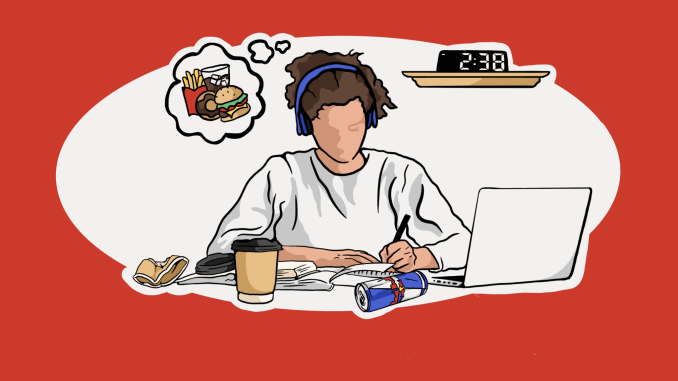
The end of the semester can be a stressful time for college students due to a build-up of exams, essays and group projects. As students prioritize school work, they often develop dangerous practices, like sleeping limited hours, not eating balanced meals, cramming for exams and drinking unhealthy amounts of caffeine and alcohol.
TikTok videos may be promoting toxic productivity standards and encouraging students to sacrifice their well-being to get more work done.
It’s dangerous for social media users to present unhealthy behaviors as normal or useful techniques to navigate college. As students experience end-of-semester stress, it’s important to utilize healthy habits instead of following unhealthy routines shared on social media that can have serious side effects on well-being.
For example, Instagram and TikTok content portraying college students’ daily routines is presented in short, appealing videos, making their behaviors seem more glamorous than they are. Overexposure to this media can cause students to believe that unhealthy habits should be included in their daily routines, like staying up late to study or increasing caffeine intake.
Insomnia and sleep deprivation are common among college students and can lead to depression and other mood disorders, according to the Centers for Disease Control and Prevention.
“I feel like students have a lot of pressure on them to perform in school, make so many friends, join so many clubs,” said Audrey Hovan, a freshman nursing major. “I feel like sometimes they burn themselves out doing everything.”
Even if it’s unhealthy, some students are willing to push their bodies to the limit during exam season. They may feel validated for endangering themselves and neglecting self-care to be successful, especially due to the normalization of these behaviors on social media.
“It’s kind of the norm, so if you are adhering to what everyone always says about college, then you are doing well in life,” said Santhi Chandrasekaran, a freshman psychology major.
To unwind during the weekends and recharge, students should choose activities that will prioritize their health, like exercising, getting in touch with nature and resting, according to Very Well Mind, a website that promotes mental health.
However, binge drinking has risen among young adults, according to the Centers for Disease Control and Prevention.
At the same time, a binge-drinking trend like the “blackout rage gallons,” is viral on TikTok, directly influencing college students to drink large amounts of alcohol from gallon jugs. Viewing content on social media about excess drinking is significantly associated with increased alcohol use and related risks.
Content creators should realize that they hold power over people and posting unhealthy habits can lead to the normalization of harmful practices. Instead of blindly posting, they should be mindful of their posts and emphasize that their posts shouldn’t be replicated in real life.
“An influencer who’s willing to recognize the power that they have would hopefully make better decisions about their content,” said Sherri Hope Culver, a media studies and production professor and director of the Center for Media and Information Literacy.
Bringing awareness to these harmful practices by highlighting healthier alternatives is important. Students don’t realize their habits are self-destructive because they see their peers seemingly succeeding when they engage in the same behaviors.
Instead of using social media to romanticize unhealthy behaviors, platforms could be used as a space to make struggles relatable and offer solutions to them. As stress in students is heightened, especially during exam season, mental and physical health should always come first.



Be the first to comment